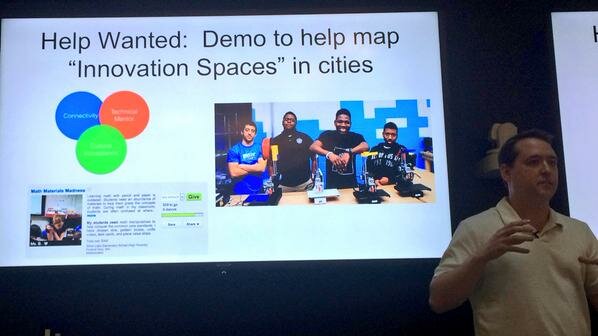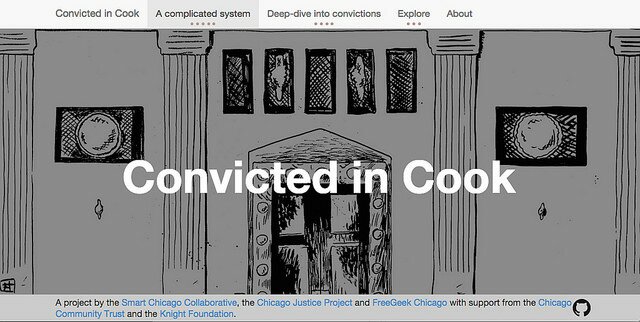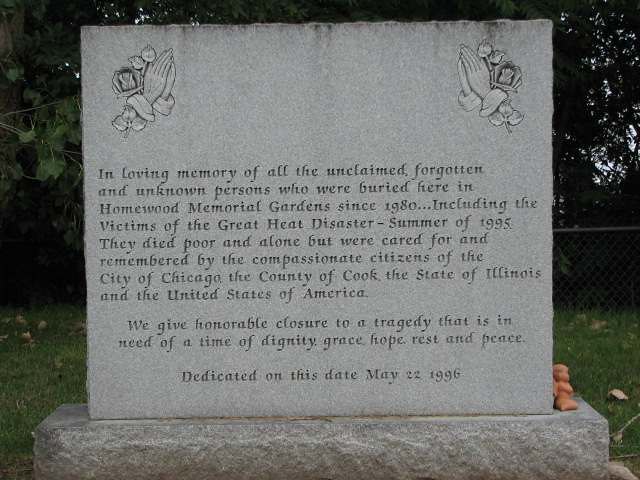 Last week was a busy week for civic technologists in Chicago with several events being held throughout the city as part of the National Day of Civic Hacking. We’ve provided a quick roundup of everything that happened last week as well as some thoughts to next steps.
Last week was a busy week for civic technologists in Chicago with several events being held throughout the city as part of the National Day of Civic Hacking. We’ve provided a quick roundup of everything that happened last week as well as some thoughts to next steps.
CitySDK Launch at Chi Hack Night

The Census Bureau launched their open data software development kit (SDK) at Chi Hack Night on Tuesday. They also helped to break the current attendance record with 124 people coming in to hear Presidential Innovation Fellow Jeff Miesel demo the CitySDK. (You can catch the full demo here and the meeting notes for the event here.)
Steve Vance has already updated his Cityscape app to take advantage of the new CitySDK. He’s created a webpage as part of Chicago Cityscape that gets the median home value and median rent for the Census tract containing your GPS-based location.
You can get more updates on the CitySDK project by following them on Twitter.
Urban Sustainability Apps Competition
On Friday, the Center for Neighborhood Technologies kicked off the weekend with the Urban Sustainability Apps Competition. The event was hosted by Stephen Philpott and took place over the entire weekend.
In attendance at the event was the CTO for the US Census Bureau Avi Bender as well as the City SDK team. The competition kicked off with some advice from Eve Tulbert – Founder of FreedomGames.
Eve’s group didn’t win the CNT Apps competition, but through the event they launched their company and now have paying customers. This year’s winner was Purshable – and app that helps grocery stores sell produce that is about to expire. You can get the full details on the event from the CNT blog.
Organize! Civic Tech Leader Training
For Civic Tech Leader Training, we wanted to provide training for people already active in their communities – but wanted to learn more about the technology side of things.
We kicked off with David McDowell from the Southwest Organizing Project who gave us an orientation into community organizing. From there, we learned about the ins-and-outs for FOIA from Matt Topic of the Better Government Association. Before we got into the tech portion of our training, we had a brainstorming session about what problems we should be focusing on in the city and how we could leverage technology to address them. We took collaborative notes during the day so that you can see all of the ideas that we generated. Our brainstorming session was later joined by US Chief Data Scientist DJ Patil who also gave some short remarks and answered questions from the audience. In the afternoon, our own Josh Kalov taught about data portals and Microsoft’s Adam Hecktman gave a class on how to use Excel to analyze open data.
We also spoke about how to use tech tools and shared some tips on social media. To cap off the day, Claire Micklin from mybuildingdoesntrecyle.org talked about how to run a hack night project.
Adler National Day of Civic Hacking
To cover the Adler National Day of Civic Hacking event, we sent our Documentor Nicole Cipri to the Adler event. Here’s an excerpt her dispatch:
On June 6th, the Adler Planetarium joined venues across the world to host Civic Hack Day. Organized by Hack For Change, Civic Hack Day brings together community members, developers, programmers, and organizers to tackle tough problems and present practical solutions. Hackers come from a variety of backgrounds and bring diverse skill sets. Problem-solvers, makers, coders, tinkerers, anyone is invited to join the events.
Last year, Hack For Change saw 123 events in 13 different countries, including at Adler Planetarium. Kelly Sutphin-Borden, an educator with the Adler who also handled logistics for the Hackathon, said this was the third year the Adler had participated in Civic Hack Day. Last year, groups created several seed projects, including an app to help link homeless LGBTQ youth to resources, and a searchable and simplified website explaining the CPS code of conduct to students and parents.
This year, six different people pitched issues facing Chicago. Among the proposals:
- A website to help engage citizens on proposed legislative regulations.
- A media campaign to protect Chicago birds.
- An online archive for photographs by Vivian Maier, a Chicago-area street photographer, which would complement a brick-and-mortar archive of her works.
- A more accessible and streamlined portal to the Bureau of Labor Statistics Occupational Handbook
- A data collection app for Cancercodebreaker.org, which would collect cancer patients’ treatment histories and share them with researchers.
- An app to help hospital patients with follow-up care after their discharge
The last of the problems presented, about helping discharged hospital patients, was proposed by Dr. Pam Khosla, an oncologist at Mount Sinai. She had not planned on participating in Civic Hack Day, but only on keeping her daughter company there for a few hours. She became inspired after listening to some of the other proposed issues. She confessed that she’d heard about Hack For Change first on WBEZ, and had been confused by the term. “I thought all hacking was bad,” she explained. “Who are we hacking? Why?”
Mount Sinai is a hospital on Chicago’s West Side, an area of the city that suffers from high rates of poverty. Many of Khosla’s patients have trouble navigating the labyrinthine process of longterm cancer treatment. Some of her patients have limited English, or low literacy, or no support network to help them. She envisioned an app or device in which a patient could input their treatment plans, and would then remind them to book transportation to their appointments, take their medication, or help explain procedures or processes. The point was to get better patient compliance, and thus, better quality of care.
After presenting the problems, Clint Tseng of Socrata offered a crash course in accessing open data provided by Chicago, Cook County, and the state of Illinois. He also stayed on hand to help groups utilize this data for their projects. Individuals broke up into teams to tackle each of these issues, usually starting with a brainstorming session. Problem Owners were interviewed about what kind of solutions would be practical, while everyone pitched in to come up with ideas for formats, funding possibilities, and organization. After a rough idea is drafted, the group had the next 24 hours to fine-tune their proposed solution, presenting it the following morning.
Lexhacks
To cover LexHacks, we sent Stephen Rynkiewicz to cover the legal hackathon that happened at WeWorkChicago. Here’s an excerpt from his dispatch:
At LexHacks, developers, designers, lawyers, lean thinkers, project managers, data analysts and other professionals were challenged to work together to create solutions that improve the efficiency and delivery of legal services, as well as the access to legal services.
“I want lawyers to step up and embrace these technologies, so that we don’t have 80 percent of folks who have a need go without legal services,” explains Daniel Linna, an organizer of the Chicago Legal Innovation & Technology Meetup group. “We can do work with developers, designers, technologists, data analysts, lean thinkers to do that.” Lisa Colpoys, executive director of Illinois Legal Aid Online, organized one of two crowdfunded contests. “Our mission really is to break down the law, make it simple enough so people who can’t afford a lawyer can handle their legal problems,” Colpoys says. “This system is scary. It’s complicated. If people want to go to court on their own, they typically don’t do very well, at least without education and some support,” Colpoys says. “Our challenge is to create some sort of a tool for people to evaluate whether it’s worth it to pursue some case or claim, or defend their case or claim.“
Jon Pasky first organized legal hackathons to recruit developers to resolve a complaint he heard from tech startup founders. “They want to talk to their lawyer,” Pasky says, “but people I found in the small business and startup side don’t, because they’re afraid of the bills.”
With Ric Gruber, who worked his way through law school as a developer, Pasky launched Openlegal, the flat-fee website that recruits clients for their law office. “Every time we automate part of the process, we’re able to hire more lawyers instead of more admin staff,” Gruber says. “We’re saving our clients 30 to 50 percent because we’ve cut administrative waste.”
You can view all the submission for the LexHacks event here.
For more information about National Day of Civic Hacking, visit the main page at Hack for Change

 On Monday, Smart Chicago Executive Director Dan O’Neil went on WBEZ’s Tech Shift to talk about what the Homan Square story says about open data in Chicago.
On Monday, Smart Chicago Executive Director Dan O’Neil went on WBEZ’s Tech Shift to talk about what the Homan Square story says about open data in Chicago.

